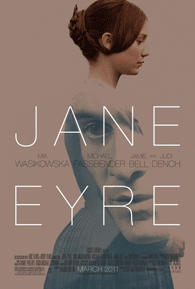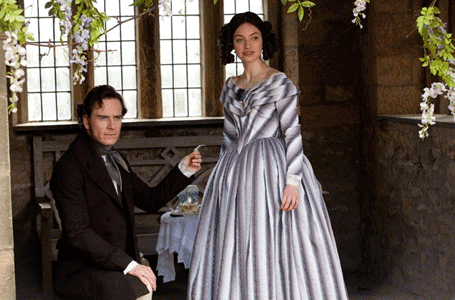
As one of the most influential of English novels, Jane Eyre bridged an important gap between the earlier Gothic writing of the late 18th to early 19th centuries, and the later, more socially realistic novels from the likes of Dickens and Hardy. Small wonder that it has been adapted this often: even today, Jane Eyre is accessible, high quality melodrama with just that little bit of depth: a mad, sexy, crazy, witty hell of a book.
The story, for those who haven’t heard it, is the grandmother of a thousand modern potboilers. Jane Eyre is a plain young governess who has a led a rough childhood in provincial England. She falls for her employer; Mr Edward Rochester, an older, wealthy and well-traveled man of the world. She is only to be torn from him when his sinister secret is revealed, and finds comfort in the company of clergyman St John (pronounced ‘Singeon’) Rivers. After a series of trials and tribulations, Jane and Rochester are finally reunited. I will not the spoil the secret here for those not in the know. These days the secret might be that he’s a vampire, as is the case in the Twilight Saga, whose author is on record as saying that her hero Edward Cullen, is a nod to Rochester in more than name. But vampire or not, it’s a mere technicality: the timeless appeal of such tales is to see a virginal but intelligent young woman resisting, confronting and eventually asserting herself over an equally intelligent, but more mysterious and often dangerous man.
Where director Cary Joji Fukunaga’s adaptation stands out is that rather than taking a more florid, opulent or openly Gothic take on the oft-told story, Fukunaga and his screenwriter, Moira Buffini, give us an economical, stripped-down retelling of Jane Eyre that captures many of the novel’s most intense bits and paces them through with such graceful timing that the two hour running time just seems to fly by. It is for example, the first adaptation of the novel I have seen to be told out of chronological order while earlier film adaptations (notably with Orson Welles and Joan Fontaine in 1943 and William Hurt and Charlotte Gainsbourg in 1996) followed the novel in being told in chronological order: this is a small difference, but the quicker and more urgent rhythm it creates is palpable throughout.
Performances wise, this is a star making turn for Mia Wasikowska. It is a truth universally acknowledged, that a young actress in possession of some talent, must be in want of a good costume pic come Oscar time, and this reviewer will not be surprised if Wasikowska is in the run for Best Actress next year. For a while, Wasikowska’s will be the performance to beat when it comes to portrayals of Eyre. Her performance as Jane is gorgeously layered in displaying the character’s distinct mix of self-doubt, barely reserved passion and quiet inner strength. One senses her big personality quivering and struggling to get out from within that petite frame. Michael Fassbender’s Rochester is serviceable; both arrogant and eloquent, but a little lacking in the character’s intensity. Jamie Bell as St John Rivers falls towards the one-dimensional and lacks texture. Other supporting players are in general good. Judi Dench as housekeeper Mrs Fairfax, Made in Dagenham’s Sally Hawkins as Jane’s despicable aunt Mrs Reed, and up-and-coming Craig Roberts as her overindulged and equally despicable son John do their best with their limited screen time.
The weakest link as far as filmmaking is concerned appears to be the dialogue, which somehow overall feels a little flat and almost too modern, almost as thought it was written for an Illustrated Classics comic book edition of the original novel instead. Sadly lacking is also much of the novel’s frequent and often underrated sense of humour and occasional levity.
Still, lazy high school students who wish to cram for the novel by watching this film, as well as long-time Bronte fans and aficionados and everyone in between can find something to rejoice for overall, the grandmother of romantic potboilers has received its strongest adaptation yet. There will doubtless be more adaptations in the future, but Fukunaga can rest assured that his will take its place among the very best.












 Printable Version
Printable Version










Reader's Comments
Be the first to leave a comment on this page!
Please log in to use this feature.